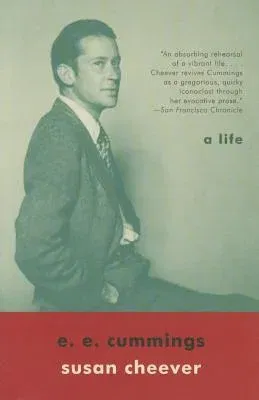Susan Cheever
(Author)E. E. Cummings: A LifePaperback, 28 April 2015

Qty
1
Turbo
Ships in 2 - 3 days
In Stock
Free Delivery
Cash on Delivery
15 Days
Free Returns
Secure Checkout

Print Length
272 pages
Language
English
Publisher
Vintage
Date Published
28 Apr 2015
ISBN-10
1101910488
ISBN-13
9781101910481
Description
Product Details
Author:
Book Format:
Paperback
Country of Origin:
US
Date Published:
28 April 2015
Dimensions:
20.07 x
13.21 x
2.03 cm
Genre:
20th Century
ISBN-10:
1101910488
ISBN-13:
9781101910481
Language:
English
Pages:
272
Publisher:
Weight:
272.16 gm